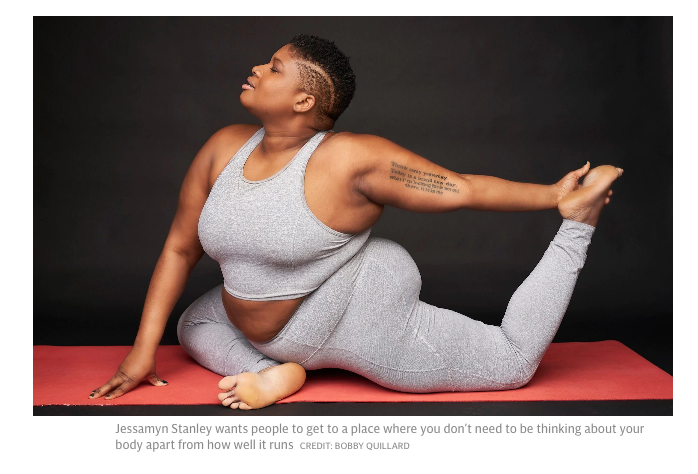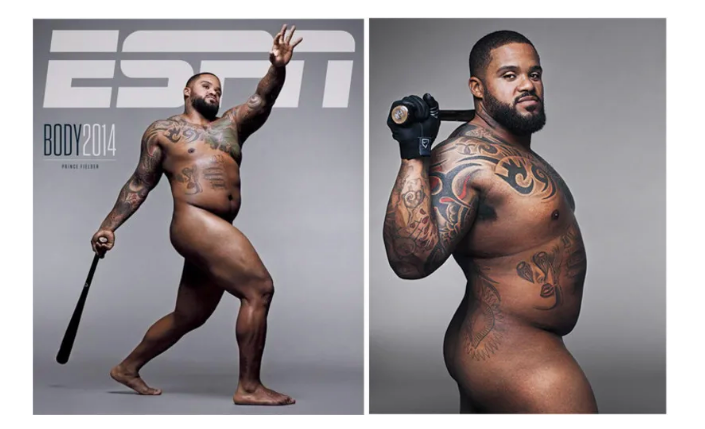A Fat Athlete is Not an Oxymoron
There’s a basic misunderstanding that a person can be in a fat body and also be athletic. The two concepts are not, and never have been, mutually exclusive.
Take yoga instructor Jessamyn Stanley, for example. She is a proudly fat, queer yoga instructor who teaches classes all over the world for all body types and experience levels. Yet, when she walks into a room, people still don’t think that she is the instructor.
Source: https://www.telegraph.co.uk/womens-sport/2019/08/19/life-bigger-pant-size-yoga-teacher-jessamyn-stanley-body-obsession/
In the article, Stanley says, “Fat people can do all kinds of things, we just clearly have a visibility issue.” And that is so true.
I remember when this “Body Issue” for ESPN came out in 2014 showing a naked Prince Fielder, first baseman for the Texas Rangers.
Source: https://theconcourse.deadspin.com/prince-fielders-naked-espn-cover-is-sexy-as-hell-1603146649
People LOST. THEIR. SHIT. Not because Fielder is naked—no, that’s common for the cover of this particular issue of ESPN magazine. No, it’s because Fielder is fat and naked and an athlete in a sport that doesn’t seem like it fits his body type. If Fielder were an American football player, someone on defense maybe, then perhaps the collective gasp wouldn’t have been so loud. We expect football players to be around 300 pounds, to create a wall to stop the run or keep the offensive line from getting into position to make a catch. And while baseball players have come in all shapes and sizes—remember Babe Ruth?—there’s still an image of what we expect one to look like that Fielder is messing with. From an article about the cover in 2014:
Source: https://theconcourse.deadspin.com/prince-fielders-naked-espn-cover-is-sexy-as-hell-1603146649
In 2016, EPSN followed up with pictures of Vince Wilfork, five-time NFL Pro Bowler on the cover. He’s also naked, also fat, also powerful, and there were also jokes.
Source: http://www.espn.com/espn/feature/story/_/id/27400369/the-body-issue#!vince_wilfork
So yes, Stanley is right… despite these examples of athletes so powerful and in their prime, fat and naked on the cover of ESPN Magazine, fat people still have a visibility issue. We are not seen to be athletic. Fat people everywhere, every day, have to battle against the assumption that our large size has come from laziness, a lack of self-esteem, poor food choices, and a lack of exercise. We are missing something fundamental about ourselves or we wouldn’t be fat.
But Vince Wilfork and Prince Fielder and Jessamyn Stanley are just three small examples of how wrong that is.
Let’s not get it twisted, though. Just because they are athletes and fat doesn’t make them any more worthy as people than people who are not athletic and fat. Or not healthy and fat. Athleticism and health and fitness are not the price of admission for being treated with the same courtesy and dignity of everyone else.
It is beyond time to start checking your assumptions about people based on their size. If you’re surprised that a fat person is doing something you didn’t think they could do, ask yourself where that assumption came from. If you assume that a fat person at the gym or out enjoying some kind of physical activity is trying to lose weight, ask yourself where that assumption came from. And if you feel compelled to congratulate that person or give them encouragement, stop and ask yourself why (and then don’t).
I’m not sure how many different ways I have to say it, but it clearly needs to be said over and over. Fat people are people and we can do anything, from being a five-time NFL Pro Bowler to being a singer and pop/hip hop/funk music star to being a person walking down the street with a cup of coffee. We’re here and we exist in all facets of life. And we are amazing.




